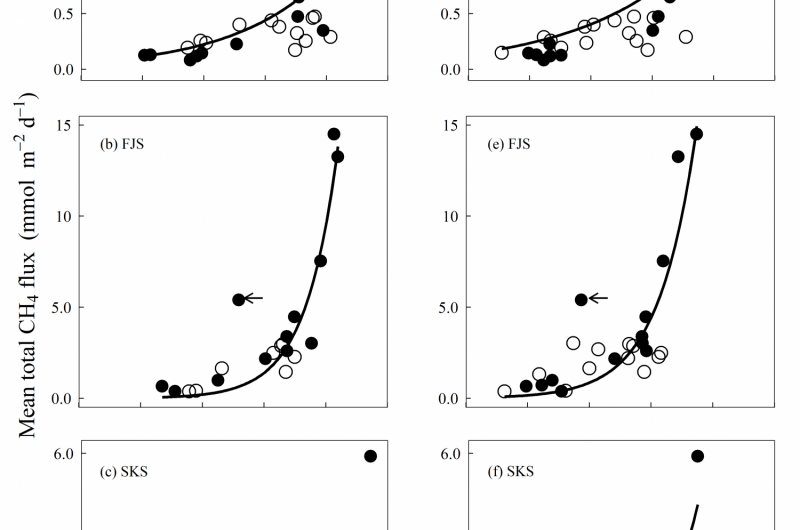Global warming will be faster than expected, news study concludes

Global warming will progress faster than what was previously believed. The reason is that greenhouse gas emissions that arise naturally are also affected by increased temperatures. This has been confirmed in a new study from Linköping University that measures natural methane emissions.
"Everything indicates that global warming caused by humans leads to increased natural greenhouse gas emissions. Our detailed measurements reveal a clear pattern of greater methane emissions from lakes at higher temperatures," says Sivakiruthika Natchimuthu, doctoral student at Tema Environmental Change, Linköping University, Sweden, and lead author of the latest publication on this topic from her group.
Over the past two years the research team at Linköping University has contributed to numerous studies that all point in the same direction: natural greenhouse gas emissions will increase when the climate gets warmer. In the latest study the researchers examined the emissions of the greenhouse gas methane from three lakes. The effects were clear and the methane emissions increased exponentially with temperature. Their measurements show that a temperature increase from 15 to 20 degrees Celsius almost doubled the methane level. The findings was recently published in Limnology and Oceanography.
While increased anthropogenic emissions of greenhouse gases are expected and included in climate predictions, the future development of the natural emissions has been less clear.
Now knowledge of a vicious circle emerge: greenhouse gas emissions from the burning of fossil fuels lead to higher temperatures, which in turn lead to increased natural emissions and further warming.
"We're not talking about hypotheses anymore. The evidence is growing and the results of the detailed studies are surprisingly clear. [DB1] The question is no longer if the natural emissions will increase but rather how much they will increase with warming," says David Bastviken, professor at Tema Environmental Change, Linköping University.
This means that warming will be faster than expected from anthropogenic greenhouse gas emissions alone. According to Professor Bastviken this also means that any reductions in anthropogenic greenhouse emissions is a double victory, by both reducing the direct effect on warming, but also by preventing the feedback with increased natural emissions.
More information: Sivakiruthika Natchimuthu et al. Spatio-temporal variability of lake CH fluxes and its influence on annual whole lake emission estimates , Limnology and Oceanography (2015). DOI: 10.1002/lno.10222
H. Marotta et al. Greenhouse gas production in low-latitude lake sediments responds strongly to warming, Nature Climate Change (2014). DOI: 10.1038/nclimate2222
Sivakiruthika Natchimuthu et al. Influence of weather variables on methane and carbon dioxide flux from a shallow pond, Biogeochemistry (2014). DOI: 10.1007/s10533-014-9976-z
Balathandayuthabani Panneer Selvam et al. Methane and carbon dioxide emissions from inland waters in India - implications for large scale greenhouse gas balances, Global Change Biology (2014). DOI: 10.1111/gcb.12575
E. J. Lundin et al. Large difference in carbon emission – burial balances between boreal and arctic lakes, Scientific Reports (2015). DOI: 10.1038/srep14248
Martin Wik et al. Energy input is primary controller of methane bubbling in subarctic lakes, Geophysical Research Letters (2014). DOI: 10.1002/2013GL058510
Journal information: Global Change Biology , Nature Climate Change , Scientific Reports , Geophysical Research Letters
Provided by Linköping University


















